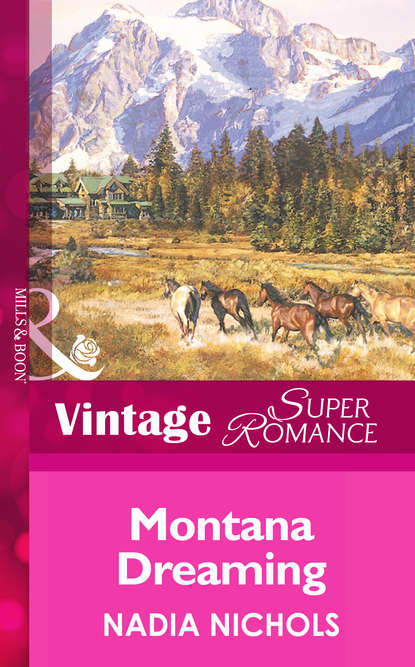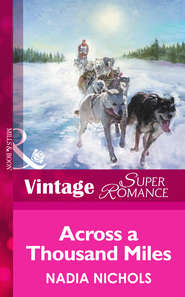По всем вопросам обращайтесь на: info@litportal.ru
(©) 2003-2024.
✖
Montana Dreaming
Автор
Год написания книги
2019
Настройки чтения
Размер шрифта
Высота строк
Поля
Now Jessie nodded. “I’ve had the part for weeks. It’s out in the barn.”
“Right. Okay, then.” He stood there for a few moments, uncertainty flickering in his eyes, then shrugged in a what-the-hell manner. “Well, I suppose if I search long enough I’ll find it.” He made to go.
“Mr. McCutcheon, I surely wish you wouldn’t.”
He stopped, half turned and considered what he wanted to say. “I didn’t sleep at all last night, thinking about things. After what you did to save this ranch, to keep it whole…” He raised the toolbox. “Fixing your truck is the least I can do.”
“You don’t owe me anything. All I ever ask is that you respect the land. I would have done anything to keep it, anything at all…except sell it off piecemeal to pay off debts until nothing of it was left.”
McCutcheon lifted his gaze to the glaciated summits of the mountain range that towered to the east. “I understand that, and I respect you for what you’ve done. But to tell you the truth, the way I’m feeling right now I almost wish I hadn’t bought it.
“When Steven Brown called me out of the blue, I had pretty much decided that maybe my wife was right—buying a ranch was a foolish dream. Then he started describing the place to me, and suddenly I wanted to see it. See if it was the way I’d imagined it in my dreams. If the mountains looked big enough, the cabins looked honest-to-God real, the creek had just the right bend in it.
“I cut out a picture once when I was a kid living in the middle of a Chicago slum,” he said. “Cut it out of a magazine. I’ve kept it all these years. It was a picture of a ranch, a real working ranch. The house was like this, all weather-beaten and silvery, with a long porch fronting it and facing the river. There were log cabins in the background, a bunkhouse, a pole barn, corrals. Big mountains. Just like this. This is the place I’ve imagined all these years, right down to the bend in the creek that passes by the old homestead cabin.”
The smell of boiling coffee permeated the cold morning air. “I should shift the pot,” Jessie said, glancing behind her into the kitchen. She paused, then ducked him a shy glance. “Whyn’t you come inside and have a cup.”
McCutcheon’s face brightened. “Gladly. Maybe you could tell me a little more about the history of this place. We didn’t have a whole lot of time for that when I was last here.”
She ushered him into the kitchen, poured two chipped ironstone mugs full of hot black brew, and they sat down at the table together. She put her hand on the table, felt the smooth irregularities of it. “My great-grandfather made this,” she said. “Hewed it from one thick plank of a big old cedar felled up in the mountains. He made it for my great-grandmother. She was the daughter of a Crow medicine man and she was given to my great-grandfather in thanks for the cattle that kept them alive through a very bad winter. He was also gifted some of the tribe’s finest horses. Those horses became the founding bloodlines of one of the purest registries of Spanish Barbs in the West.
“He kept a journal, which my father donated to the Montana Historical Society. In it he wrote often of his wife. When I was young I read that journal a whole passel of times, but it wasn’t until I was in my early teens that my father told me my great-grandmother had been a full-blooded Crow Indian. My great-grandfather never made mention of that except for one brief passage in the journal, where he regretted that they couldn’t communicate better.
“Which was probably quite an understatement, considering she probably didn’t speak one word of English, nor he of Crow. From the way he wrote about her, it was plain that he loved her a great deal, so they somehow managed to overcome the language barrier. She bore him two sons. One died when he was fifteen, thrown from a rough bronc. The other was my grandfather.” Jessie glanced at McCutcheon and then let her eyes drop to her mug of coffee.
“My grandfather was a half-breed destined to inherit one of the largest ranches in Montana at a time when people looked darkly on all things Indian, and particularly despised half-breeds. He married another half-breed, a girl from the Blackfeet tribe, whose mother had married a Scottish trapper. She was very beautiful and kind. Her name was Elsa, and she was my father’s mother. She is one of my earliest memories. A good memory.” Jessie glanced again at McCutcheon, mortified at her unnatural wordiness. “Sorry. I guess I’m giving you the lowdown on the Weaver women.”
“Please, continue,” McCutcheon urged. “I want to hear it. All of it. Everything that made this place what it is. Tell me about your earliest memory. Tell me about your grandmother.”
Jessie held his gaze for a few moments and then nodded slowly. “It was a horseback ride. I was young, maybe four years old, and the horse was as tall as the mountains and as swift as the wind that blew down the valley. The horse was running hard, but I wasn’t afraid. I was in my grandmother’s strong arms and she held me safe upon that horse as it flew homeward. Over the thundering wind I heard her singing a song in her native tongue. It was joyous and full of life. She sang into the wind as we galloped home from someplace away. That was a good memory!
“I remember that when we got back home my mother was very angry. She was afraid I might have been hurt. She took me from Grandmother and told me I was never to go with her again.” Jessie paused and smiled a faint, bitter smile. “That was a bad memory. My mother was white. She loved my father but never understood his heritage, and she feared what she didn’t understand. Life out here was hard for her. She came from Denver and she was never happy. My grandparents frightened her. The land frightened her. She hated the sound of the wind, the size of the mountains, the stillness at dawn.
“My father tried to make her happy. He built her this place of boards so she could have the house painted any color she wanted. But the wind and the weather stripped the paint away, and in one bad winter all her rosebushes froze. If she hadn’t died of the bad pneumonia, I think she would have left us.” Jessie ran her palm over the table. “She died because I brought home a bad flu from school when I was in the second grade and she caught it. I got sick and should have died too, but I didn’t. I was seven years old when she died.”
McCutcheon sat in silence for a long moment. “I’m sorry,” he said. “That must have been a hard time.”
“Harder on my father. He loved her so. He never got over her death. My grandparents died not many years after that, just months apart. And then it was just my father and me.”
“Any hired hands?”
Jessie nodded. “At first. In the good times we kept three full-timers down at the old cabin and a handful of part-timers during branding and roundup. Then, one by one, we had to let them go. Cattle prices kept falling. Land taxes and living costs kept rising. My father wanted me to go to college, so he took a second mortgage on the ranch to pay my tuition. I finished my four years of college and was in my third year of vet school, when he got sick. The medical bills were staggering, debts piled up, the bank sent notices. I quit school two years ago, Dad died last year…and here we are.”
McCutcheon drew a deep breath and released it slowly. “I’m sorry.”
She shrugged. “Not your fault. Nobody’s fault, really. I’m just glad you came along when you did. Otherwise the bulldozers would already be at work carving out a golf course along the creek.”
“I guess we have Steven Brown to thank for that.” McCutcheon hesitated. “I have a question about the brand your horses and cattle wear. It looks like a D with a long bar through the middle. Is that what you call this place? The Bar D? Everyone just refers to it as the Weaver ranch, but don’t most ranches have names?”
“Most ranches aren’t owned by half-breed Indians,” Jessie replied. “The brand you’re referring to symbolizes a bow and arrow. If you look sharp, you’ll see there’s an arrowhead on one end of that bar. It was a pretty radical brand one hundred years ago, so we always just called it the Weaver ranch and let people scratch their heads and wonder.”
McCutcheon sat back in his chair. “I’ll be damned,” he said. “The Bow and Arrow.”
Jessie nodded. “Yessir. Big secret. Might get you scalped if you let it out. What about your wife? You’re married, aren’t you?”
“Twenty-odd years, no children. She didn’t want them. Wanted to be free to travel. She’s in Paris right now. Spends six months a year there. She’d never come out here, not in a million years. Not her kind of place. She likes bright lights and big cities. It’s not her fault that her husband’s a throwback to a different time and place. I can’t blame that on her. She’s smart, funny, beautiful, well educated. She should’ve been a politician. Maybe then we’d have a decent president someday.”
“Her?”
He laughed. “That wouldn’t surprise me in the least. She’d be right at home in the Oval Office, and she’d do a damn fine job of running this country, too.” He finished his coffee, pushed to his feet. “That was good, thanks. Now, if you’ll tell me where to find that fuel pump, I’ll get down to business.”
Jessie rose. “Mr. McCutcheon, really, I can fix the truck myself or hire someone to fix it. I have a little money now, in case you forgot.”
“I realize that,” he said. “But I’m going to fix it for you and you’re going to let me. And there’s something else.” He paused while he phrased his next announcement and shored himself up with a slow deep breath. “I need a caretaker for this place.” She shook her head fiercely and he raised a hand. “Yes, you have enough money to buy yourself a moderate spread and continue breeding your Spanish horses, but listen to what I have to say, because I’ve thought about this a long time.
“Nobody loves this place the way you do. Nobody would ever care about it as much or look after it as well. I’m asking you to stay on as my caretaker. Right here. In this house. I won’t be around much for a while, and when I come I’ll stay in the old cabin. I’ll pay you a good salary and all I ask is that you keep the place in good repair. You’d do that anyhow, without being asked, without being told. You know how to do what needs to be done.”
“No.”
“You don’t have to give me an answer right now. Think on it. And think on this. If you don’t stay I’ll have to hire someone else to do what you were born to do. I’d hate to do that. This place belongs to you in a way that all the money in the world and countless legal documents can’t change, and even more than that, you belong to this place. So please, I’m asking you to seriously consider my offer.”
Jessie shook her head before he had even finished speaking. “No,” she repeated. “This isn’t my home anymore. I have to move on. There’s no other way for me.”
“I wish you’d at least consider it.”
“I already have,” she said. “The answer is no, Mr. McCutcheon.”
STEVEN TOOK the call in his office. It was Caleb McCutcheon, speaking on his car phone as he drove from the Weaver ranch back to Katy Junction.
“Listen,” he began without preamble. “I need your advice….”
Steven sat at his desk while McCutcheon told him about the job offer he had made Jessie Weaver. “She refused me flat out,” McCutcheon finished. “I was hoping maybe you could talk to her. Get her to change her mind and stay on. She has to stay. Somehow we have to convince her!”
Steven closed his eyes and kneaded the band of tension between his eyes. He was silent for several long moments. “I’ll try,” he said. “But she has to walk her own path.”
After he hung up he sat in stillness and reflected that, in hindsight, they should have stipulated in deed that Jessie Weaver stay on at least another five years to manage the ranch and make the transition an easier one. Too late now. He stared out the window at the city below, but he was seeing Jessie’s mountains.
They were everywhere, those mountains. Rearing up in every direction, walling off the horizon in hues of blue and purple and slate gray, except at dawn or dusk, when they glowed as if lit from within. There was snow on some of the higher peaks—snow that remained nearly year-round, a constant reminder of the harsher life in mountain country. Yet, for all their violent moods, the mountains were heartbreakingly beautiful.
Seemingly rugged and yet so fragile. So vulnerable to the predation of mankind. He understood why Jessie had done as she had. He had seen the ugly urban sprawl, the housing developments, the new roads, the encroachment of a wealthy and burgeoning population into sacred areas that one once thought would never be sullied.
Thanks to Jessie Weaver’s sacrifice some of the land was safe. But how was he going to convince her to remain? McCutcheon’s plea had aggravated an anguish of his own: the prospect of Jessie leaving this place and the incomprehensible reality that he might never see her again. In their times together Jessie had never led him to believe that anything other than friendship existed between them; still, he felt closer to her than he had to any other woman.
McCutcheon could hire other caretakers, men or women with environmental acumen, who had the good sense to manage the land largely by diplomatic non-interference with Mother Nature. Yet clearly the best of them wouldn’t be enough.
So Jessie Weaver had to stay. The fact was as elemental as the sun rising in the east. Without her presence, the very spirit and soul of the land she loved would wither and die; he was as convinced of this as McCutcheon was. Somehow, they had to convince her of the same thing.
But how?











